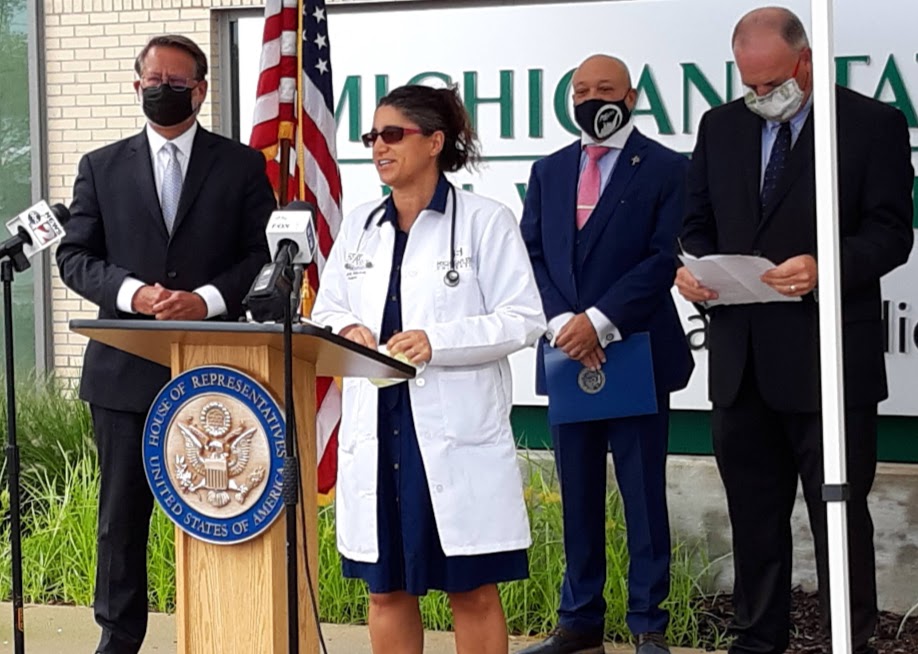By Coner Segren
Without action from Congress, funding for the Flint Registry will expire in June of 2021, several top Michigan elected officials and a health expert announced at a press conference Aug. 26.

Congressman Dan Kildee, Mayor Sheldon Neeley, Senator Gary Peters, and Dr. Mona Hanna-Attisha all spoke in favor of legislation designed to reauthorize the Registry, which since 2016 has been accumulating data about the effects of the Flint water crisis and matching parents and kids with resources to help in the aftermath.
Legislation already passed by the U.S. House of Representatives would extend $10 million in new funding to the Registry through 2023. Senators Peters and Debbie Stabenow have both co-sponsored parallel legislation in the Senate that they are in the process of advocating for.
The Registry initially received funding as part of a $170 million aid package passed by Congress and signed by President Barack Obama in 2016 with the purpose of pairing parents and kids exposed to lead during the water crisis with vital services including home book delivery, Medicaid access, and neurodevelopmental assessments for children.
With the funds provided the Registry also has offered $50 “thank-you” checks mailed to participants who fully enroll in the Registry. Since 2016, over 30,000 people have started enrollment, 12,000 have been fully enrolled in the Registry, and over 14,000 referrals have been made over the years.

Advocating for the Flint Registry Aug. 26: Dr. Mona Hanna-Attisha, flanked by (left to right) Sen. Gary Peters, Mayor Sheldon Neeley, and Rep. Dan Kildee (Photo by Coner Segren)
All the speakers stressed the major impact the Registry has had in the wake of the water crisis.
“Justice for the kids of Flint, for the people of Flint, comes in lots of different forms,” Kildee said. “A significant piece of that is the work of the Flint Registry. This is the mechanism that connects the people of Flint to the help that they need.”
He also stressed the need for those affected to keep connecting to the Registry so that Flint residents can keep informed of vital resources the city is offering.
Peters called on the federal government to make good on its commitment to help Flint work through the water crisis for as long as it takes.
“To fund this program for only a few short years and then to drop the funding would be simply unacceptable,” Peters said. “This investment needs to continue up to 2031 and perhaps longer. We know we need to have long term funding.”
Mayor Neeley echoed the point, saying, “Flint is still at an intersection of crisis. We need to do things that work. This registry works.”
In the midst of the COVID-19 pandemic, funding the health infrastructure built by the Flint Registry has become even more essential, the speakers said. One of the biggest challenges facing the Registry and the families who utilize it is the sheer volume of referrals coming at the same time that the COVID crisis has forced most businesses and agencies to drastically scale back capacity or in some cases temporarily shut down.
In July 2020 alone over 1600 referrals were made while at the same time places like Flint’s Neurodevelopmental Center for Excellence are down to seeing one patient at a time.
The press conference speakers also briefly touched on the recent $600 million settlement by the State of Michigan with victims of lead exposure. The settlement provides cash payments to parents, children, and businesses, most impacted by the Flint water crisis, as well as some funding for special education services.
While the settlement provides some financial restitution, all the speakers agreed it was not nearly enough to provide restorative justice to the community.
“That settlement may sound like a big number, $600 million, but when you divide it by the population of Flint, it’s not enough. It’s not enough to make sure we can continue building that public health infrastructure that’s been disinvested in for decades,” Hanna-Attisha said.
Kildee also made clear this is merely one settlement among several, that more can be expected in the future, and that the settlement will not preclude accountability for the people whose decisions contributed to the crisis or the need for future investment in public health.
“It’s also important that we recognize that justice could come in other forms. Holding individuals accountable for the decisions that they made, the callous choices that they made that was the root cause of this crisis,” he said.
“Justice for the people of Flint may come in the form of compensation to them, support for them, and holding individuals accountable for what was done. But real justice will come when we make sure this doesn’t happen again,” Kildee said.
Flint residents can sign up for the Flint Registry by calling 833-GO-FLINT or visiting flintregistry.org. In-person enrollment has been suspended indefinitely due to the ongoing pandemic.
EVM Staff Writer Coner Segren can be reached at csegren@umich.edu.



You must be logged in to post a comment.